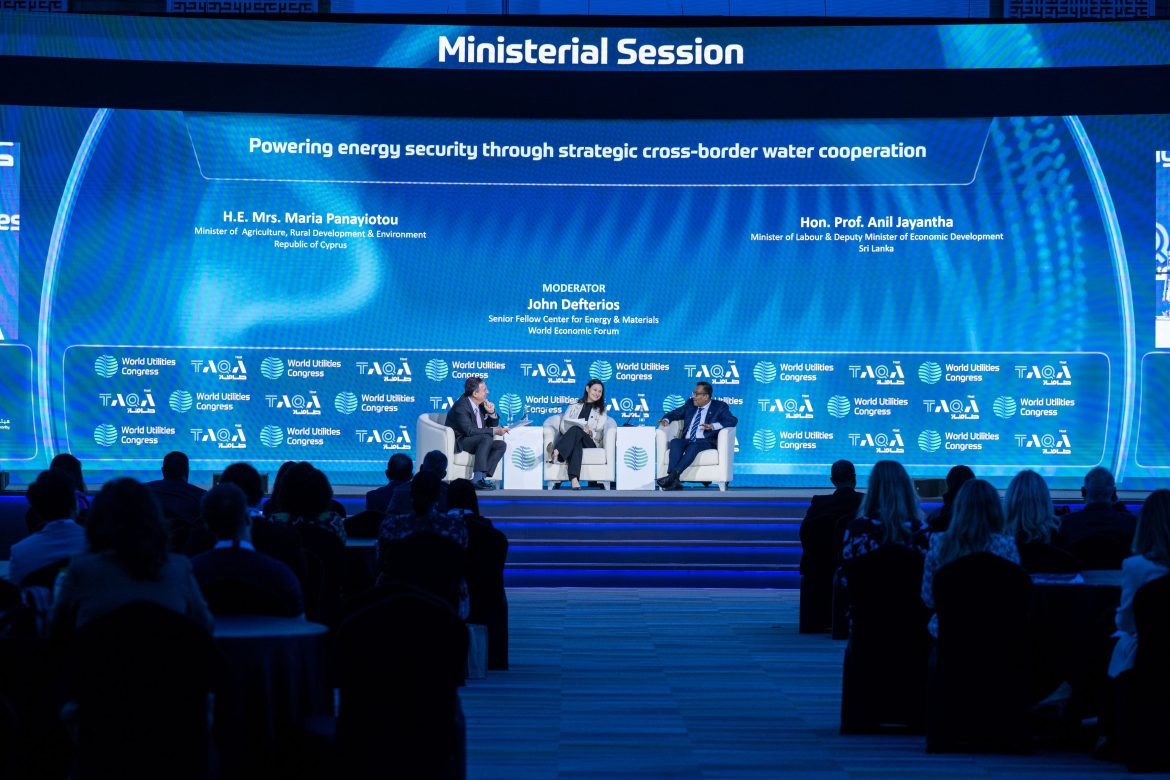The World Utilities Congress 2025 continued today at ADNEC Centre Abu Dhabi, solidifying its role as a global platform for sector-wide transformation. Bringing together global leaders, policymakers and innovators under the theme Innovating for a New Age of Utilities, day two of the Congress showcased how policy, technology and investment are converging to reshape utilities systems worldwide.
Hosted by the Abu Dhabi National Energy Company (TAQA) and brought to you by dmg events, the second day of the Congress featured high-level discussions that underscored the urgent need for scalable innovation, strategic investment and global collaboration to accelerate the energy transition. With electricity demand surging and water scarcity becoming more acute, delegates explored how integrated infrastructure, advanced technologies and climate-aligned policy can work in tandem to transform the global utilities landscape.
Jasim Husain Thabet, Group CEO and Managing Director of TAQA, said: “The utilities industry stands at the forefront of solving critical global challenges – from ensuring water security to delivering reliable, low-carbon energy. Whether it’s system flexibility, water resilience or clean energy integration, these issues have a direct impact on the communities we serve. In this Year of Community, it is a reminder that our role as a utilities provider goes beyond infrastructure — it is about contributing to sustainable, inclusive growth for all. The World Utilities Congress provides a vital platform for sharing scalable solutions, forging partnerships, and shaping the policies and technologies that will define the future of power and water worldwide.”
A Ministerial Panel titled “Powering Energy Security Through Strategic Cross-Border Water Cooperation” examined regional collaboration as a critical enabler for water resilience and sustainable development. H.E. Alejandro Gallardo Baldiviezo, Minister of Hydrocarbons and Energy of Bolivia; H.E. Mrs. Maria Panayiotou, Minister of Agriculture, Rural Development and Environment of the Republic of Cyprus; and Hon. Prof. Anil Jayantha, Minister of Labour and Deputy Minister of Economic Development of Sri Lanka, engaged in a meaningful dialogue to explore ways to enhance cross-border water security.
A key session on day two was also the Global Leadership Panel titled “Realising the ambition: tripling global nuclear energy capacity by 2050.” Senior executives from organisations including the South African Nuclear Energy Corporation (NECSA), Siemens Energy, the World Nuclear Association, EPRI Gulf, and Emirates Nuclear Energy Corporation (ENEC) explored the growing role of nuclear in global decarbonisation strategies. The panel addressed how innovation in small modular reactors (SMRs), streamlined regulatory frameworks, and increased investment—estimated at $100 billion annually—can unlock nuclear energy’s potential as a cornerstone of a low-carbon future.
Speaking on the panel, Karim Amin, Board Member at Siemens Energy, highlighted the importance of striking a balance between advancing nuclear energy and maintaining continuity across the supply chain. He stated: “There is no net zero without nuclear energy. If we really want to meet net zero, we must focus on carbon capture and nuclear energy.”
Across the exhibition, the Innovation Hub continued to showcase transformative technologies aimed at building smarter, more sustainable systems. The Innovation Hub, which includes the Cleantech Theatre and the Climate Tech Theatre, featured cutting-edge innovations that addressed real-world challenges in power and water. From real-time grid analytics and decentralised renewables to smart water networks and modular infrastructure, the Innovation Hub brought together youth entrepreneurs, global tech leaders and utilities pioneers, driving progress on the ground toward net-zero outcomes.
The Cleantech Theatre highlighted the growing importance of electrification across sectors and the critical role of ESG-led innovation in decarbonising utilities, transport and energy systems. Meanwhile, the Climate Tech Theatre explored strategies for integrating renewables into energy systems, with a strong focus on emerging technologies, regulatory evolution and the drive toward a cleaner, more resilient energy future. A panel discussion titled “Renewable-powered desalination for sustainable water supply” featured experts from Department of Energy – Abu Dhabi, EWEC, ENGIE, Etihad Water & Energy, and SUEZ – Near and Middle East, who examined how solar, wind, and other renewable sources are being harnessed to power desalination sustainably.
Speaking on the panel, Maitha Ahmed Al Hallami, Project Manager at Department of Energy – Abu Dhabi, said: As global water stress increases, renewable-powered desalination has emerged. Abu Dhabi’s economy has entered a new age of transformation and now is the moment for action across the whole water and energy nexus.”
She added: “In Abu Dhabi, we view renewable powered desalination not just as a technological evolution, but a strategic enabler of economic diversification and environmental stewardship.”
The Congress concludes tomorrow, Thursday 29 May, with high-level sessions on climate finance, urban decarbonisation and regional energy integration, continuing the journey toward a more sustainable and connected utilities future.



